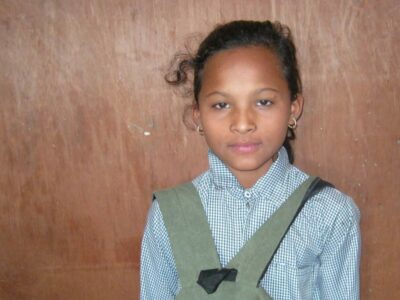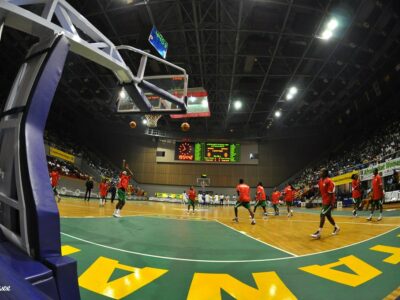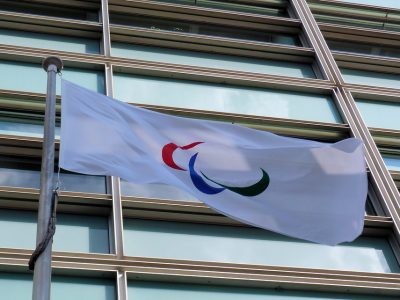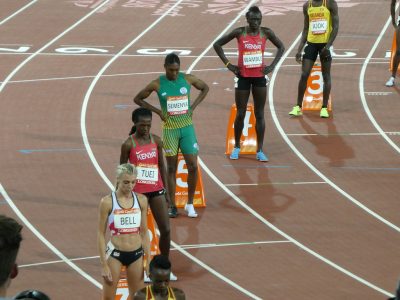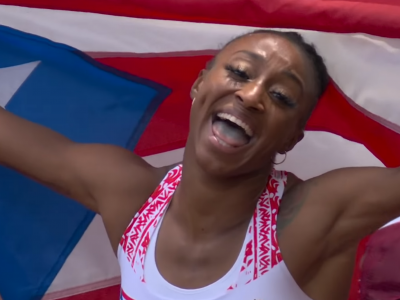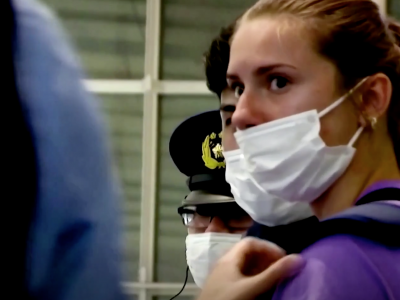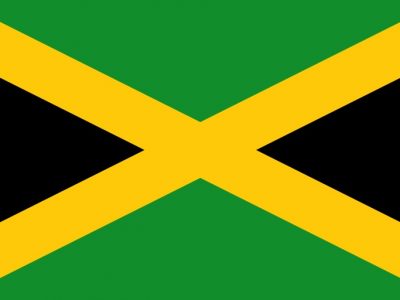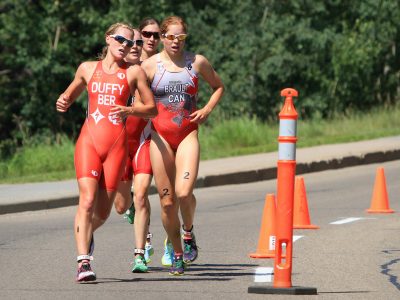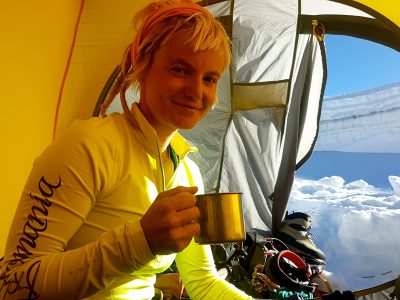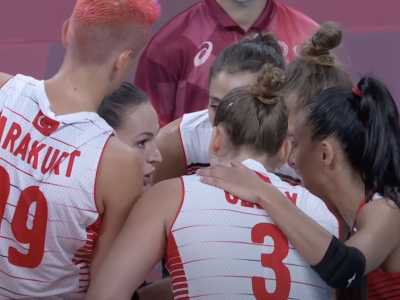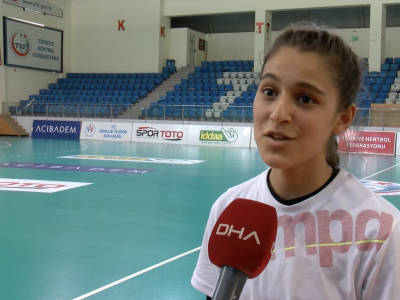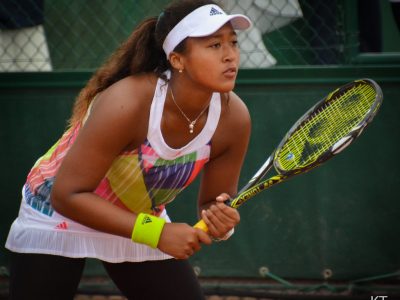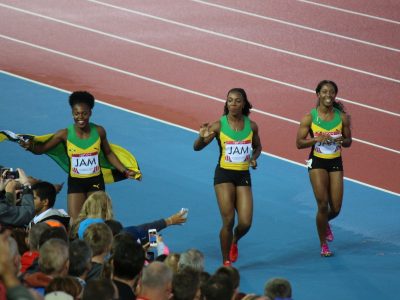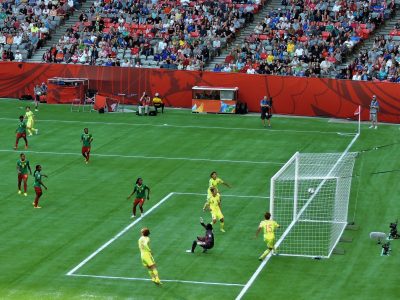
Illustration by Giovana Fleck, used with permission.
This year, with the Olympics, the Paralympics, the European Football Cup and a world that had been trapped at home for many months, televised sporting events became a way to connect with the outside world, and with other countries. At the other end of the spectrum, for many people living through lockdown, getting out of the house to exercise became crucial for their mental and physical health. YouTube yoga, Zoom barre, micro-workouts, long walks with the dog and a general worry about our already sedentary lives becoming even more sedentary, all highlighted the importance of movement, exercise and sports.
Some historic barriers were lifted in 2021, especially for queer athletes and other marginalized groups. For the first time, openly trans athletes competed at the 2020 Tokyo Olympics, an event that saw a record number of LGBTQ+ athletes. Additionally, the first openly gay men came out in both the NHL and the NFL in the United States.
Athletes used their platforms to talk about sexism, racism, authoritarianism and mental health, and many of them sparked much-need conversations and drew attention to issues that had long been overlooked.
For example, Hidilyn Diaz, the first-ever Olympic medalist from the Philippines, used her victory to highlight Philippines President Rodrigo Duterte’s authoritarian crackdown on free speech, and even mentioned that she had once been labeled an ‘enemy of the state’ after fundraising for her athletic endeavors.
Sports, including organized and competitive activities and the other things we do to move our bodies, have long been dominated by white men. But women are taking their rightful place in this arena, with many women taking home gold medals and records for their countries at the Olympics, while others broke down stereotypes simply by joining the sporting world. Despite much progress to open the field up to all, we still frequently find instances of discrimination in sports.
The many double standards that women face were brought to light in 2021 when a cleric in Turkey criticised the Turkish Women's volleyball team for their ‘immodest outfits’ soon after the Norwegian women's handball team was fined for opting for slightly more conservative shorts, as opposed to bikini bottoms.
Similarly, racism in sports was thrust into public discourse when Black English footballers were the target of horrific racial abuse after the team lost in the Euro final. But racist incidents were not just confined to the audience: The International Olympic Committee was accused of upholding racist policies numerous times during the 2020 Olympics. They refused to allow Black swimmers to wear specialized swim caps that would protect afros and also forbade any athletes from using their platform to publicly challenge oppression or racism — a long-standing and powerful tradition at the Olympics. And we cannot forget the raging controversy around women athlete’s testosterone levels, which many said unfairly discriminated against African female athletes.
But these problems are not limited to the most popular sports or international sporting events. Women who prove themselves in sport are regularly patronised, and those who achieve victories have to fight twice as hard to get there. The conversation around sports regularly ignores the mental health impact of athlete’s rigorous training regimes and public position. Athletes who prioritise their mental health have even been penalised for doing so.
At Global Voices, we recognize that identity and sport are intrinsically related and that for many athletes, sports provide a platform to promote equality and defy oppression. We believe sports are inherently political and support athletes who use their position as a platform for change. This coverage seeks to examine sports from the perspective of those who have historically been underrepresented in sports discourse, to consider their achievements, struggles, the injustices they face.
Take a look at our stories below:
Stories about Sports and diversity
‘My boyhood football club wants to kill me’
Liverpool FC's support for a disillusioned Palestinian fan of Chelsea FC, by framing a picture of his brother at their stadium, brought joy after Chelsea's disappointing stance on Gaza.
How Morocco’s Atlas Lions made history at the 2022 World Cup
Morocco's national football team, the Atlas Lions, was the first African and Arab country ever to make it to the semi-finals of the World Cup.
Cameroon’s teenage cricket star Maeva Douma takes women’s sport to greater heights
Cricket, a relatively new sport in Cameroon, is on a steady rise with over 7,000 children from different regions who are now being trained for the game.
Female foeticide to football in Nepal
Srijana Singh Thakuri of Nepal's national women's football team: "My story is not unique. It is just what happens when girls and women are given a chance, opportunity, and investment."
FIBA Women's Afrobasketball tournament continues in Cameroon amidst sexual abuse scandal
Reports allege that coaches and Malian Basketball Federation (FMBB) officials for Mali's under-18 and under-19 national teams sexually harassed, abused, and assaulted dozens of teenage players since 1999.
Athletes’ mental health is neglected in post-Olympic phase, new study finds
With the Olympic Games and the Paralympics both over, there have been concerns about what the fame and spotlight does to athletes post-Games.
Team Azerbaijan returns from Paralympics with 19 gold medals
Team Azerbaijan, secured a total of 19 medals, including 14 gold, 1 silver, and 4 bronze.
Namibian female sprinters are victorious at World Under-20 Athletics Championship amidst bans over discriminatory tests
In April 2021, the World Athletics introduced new rules for female classification which banned four athletes — all from Africa — from participating in the 800m race.
Camacho-Quinn's historic Olympic win sparks discussion on Puerto Rican identity
"Did you know that our first and only Olympic gold medals have been won by two women?"
Belarusian sprinter sent home from Olympics by Belarusian officials says she will ask for asylum
24-year-old Krystsina Tsimanouskaya said she was not worried about being kicked off the national team, but was afraid she would be imprisoned once she arrived in Belarus.
“One, Two, Three!” Jamaicans thrilled by their women sprinters’ Olympic run
The race ended with Elaine Thompson-Herah breaking American sprinter Florence Griffith-Joyner's 1988 Olympic record with a time of 10.61 seconds, making her the second-fastest woman ever.
Bermudians are ‘bursting with pride’ as triathlete Flora Duffy brings home the country's first Olympic gold
Duffy completed the course a full minute and 14 seconds ahead of her closest competitor for a convincing win—and Bermudians cannot contain their elation!
Filipino weightlifter Hidilyn Diaz makes history for winning the Philippines’ first ever Olympic gold medal
"A woman unfairly included in the drug matrix wins the first Olympic gold medal for the Philippines. Coincidence or a foretelling? The last man standing is a woman."
Community support is vital to women athletes: Kosovo alpinist Uta Ibrahimi
Uta Ibrahimi, an alpinist from Kosovo, talks about her mountaineering adventures and the challenges she faces as an gender equality and environmental activist in this interview for Global Voices.
Pakistani woman cricketer Nida Dar faces sexism from a former cricketer
Excerpts of a recent interview with Abdul Razzag and Nida Dar show him pointing out that the top woman cricketer is "manly".
Religious cleric criticizes Turkey's women's volleyball team for their appearance in Tokyo Olympics
Turkey's women's volleyball team, known as the "Sultans of the Net," beat China 3–0 during a Tokyo Olympics match on July 25.
In Turkey, 13-year-old girl challenges stereotypes in athletics
A 13-year-old handball player from Turkey's southeastern province, Şanlıurfa, is breaking stereotypes while galvanizing support for girls' participation in sports both in her village and around the country.
Naomi Osaka's French Open and Wimbledon withdrawals highlights athletes’ mental health
The pandemic exacerbated concerns around mental health among sports personalities. A number of high-profile athletes have been open about their pressures and mental health challenges associates with their sports.
Jamaica’s ‘Mommy Rocket’, Shelly-Ann Fraser-Pryce, is the fastest woman alive
On June 5, Jamaica's two-time Olympic champion Shelly-Ann Fraser-Pryce became the second fastest woman in history to win the 100 metres with a blazing 10.63-second run.
Will the Indomitable Lionesses of Cameroon ever roar again on the football field?
Cameroon's women's national football team has experienced setbacks. But deputy head coach of the squad is convinced there is a glimmer of hope in sight.





